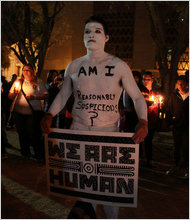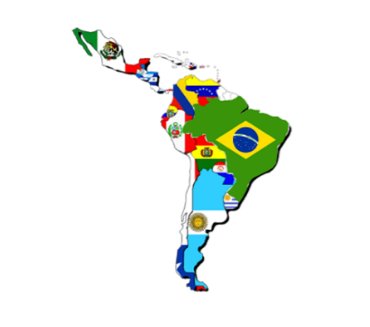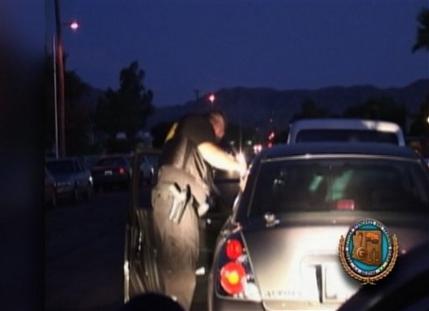Randal Archibold, who has led the paper’s slanted, whitewashed coverage of Arizona’s fierce illegal immigration fight, again focused the feelings of the minority, not the majority of Americans, talking to Latinos in Phoenix for Friday’s “Arizona Law Is Stoking Unease Among Latinos.” His concluding verdict: “many Latinos remain unconvinced.”Among those Archibold interviewed was someone who “spray painted himself white and wrote on his body, ‘Am I reasonably suspicious?'” (Monica Almeida captured the image for the Times.) Who could fail to be swayed by such an argument? When Gov. Jan Brewer signed Arizona’s new immigration enforcement law, giving police departments broad power to make immigration checks, she sought to allay concerns from Hispanic citizens and legal residents that they would be singled out for scrutiny.
 “We have to trust our law enforcement,” Ms. Brewer said. “It’s simple reality. Police officers are going to be respectful. They understand what their jobs are. They’ve taken an oath, and racial profiling isn’t legal.”Those words ring hollow to many Latinos, including Jesus Ruiz, 25, a college student in Mesa, Ariz., who, like many Latinos here, believes that all too often the police view them suspiciously and single them out for what they consider questionable stops or harassment.
“We have to trust our law enforcement,” Ms. Brewer said. “It’s simple reality. Police officers are going to be respectful. They understand what their jobs are. They’ve taken an oath, and racial profiling isn’t legal.”Those words ring hollow to many Latinos, including Jesus Ruiz, 25, a college student in Mesa, Ariz., who, like many Latinos here, believes that all too often the police view them suspiciously and single them out for what they consider questionable stops or harassment.
In one stop in 2004, Mr. Ruiz said, an officer pulled him over for speeding 10 miles over the limit and went on to question him on where he was going to school and whether he lived with his parents, and finally asked for his Social Security number.“I was thinking, is he supposed to be asking me for that and all these questions for a speeding ticket?” said Mr. Ruiz, who spray painted himself white and wrote on his body, “Am I reasonably suspicious?” at a recent protest against the new law, which goes into effect in late July.But it is not just young people.
Archibold then told an anecdote from a Phoenix judge who has been pulled over twice for traffic infractions, but not given a ticket, which somehow adds up to…something or other.Judge Jose Padilla of Maricopa County Superior Court in Phoenix, says that twice since he became a judge in 2006, the police have pulled him over, alleging minor traffic infractions. Even though Judge Padilla, 60, did not disclose his occupation, he ended up not receiving a ticket. He said his complaints to the police department led to sensitivity training for the officers.
Though the law isn’t even being enforced yet, Archibold managed to collect reports of immigrant harassment:
Already, he said, there are anecdotal reports that some police departments in the state are asking people for their papers. He said his department had received a picture of a patrol car near a Border Patrol vehicle, as if proximity proved that officers were already collaborating to carry out the law.Between rehashing recent incidents showing “tensions between law enforcement and some Latinos” in Arizona, talk of lawsuits and “roundups” of illegals, and a cameo by Sheriff Joe Arpaio, Archibold didn’t get to any supporters of the law (who are the clear majority both in Arizona and nationwide) until paragraph 31 out of 37).
Still, many Arizonans who support the law believe racial profiling concerns are overblown or a smokescreen to hide a belief that borders should be wide open.Archibold concluded with this less than shocking statement: “But many Latinos remain unconvinced.”A sidebar article by Larry Rohter (a fiercely pro-Obama reporter from the 2008 campaign) offered the less than earth-shattering news that some leftist musicians are boycotting Arizona in protest of the law, led by Zach de la Rocha of Rage Against the Machine.
 PHOENIX Seven other Latin American countries want to join Mexico in supporting a lawsuit challenging Arizona’s immigration enforcement law.Bolivia, Colombia, El Salvador, Guatemala, Nicaragua, Paraguay and Peru filed separate, nearly identical motions to join Mexico’s legal brief supporting the lawsuit filed by U.S. civil rights and other advocacy groups.A federal judge formally accepted Mexico’s filing July 1 but did not immediately rule on the latest motions filed late last week.
PHOENIX Seven other Latin American countries want to join Mexico in supporting a lawsuit challenging Arizona’s immigration enforcement law.Bolivia, Colombia, El Salvador, Guatemala, Nicaragua, Paraguay and Peru filed separate, nearly identical motions to join Mexico’s legal brief supporting the lawsuit filed by U.S. civil rights and other advocacy groups.A federal judge formally accepted Mexico’s filing July 1 but did not immediately rule on the latest motions filed late last week.

